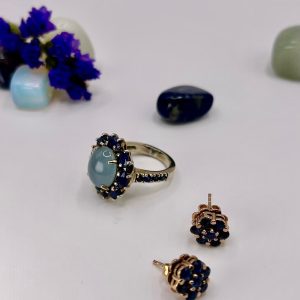
by Y | Aug 30, 2024 | ข่าวสารเว็บไซต์, ข่าวโปรโมชั่น, ทั่วไป อื่นๆ, ออนไลน์น่ารู้, แนะนำสินค้าและบริการ
Crafted jewelry accessories encompass a wide range of handmade orartisanal pieces,
including not just rings but also necklaces, bracelets, earrings,
and more. These accessories are often valued for their uniqueness and the
personal touch that goes into their creation. Here’s an overview of
crafted jewelry accessories and what sets them apart 
Types of Crafted Jewelry Accessories
Necklaces
Designs From simple pendants to elaborate statement pieces, crafted necklaces can feature unique chains, custom pendants, or intricate settings.
Materials Commonly used materials include precious metals, gemstones, beads, and organic elements like pearls or shells.
Bracelets
Styles Crafted bracelets can range from delicate bangles and charm bracelets to more robust cuff designs.
Techniques Artisans might use techniques like wire wrapping, beadwork, or metal forging to create unique patterns and textures.
Earrings
Types Options include studs, hoops, drop earrings, and chandeliers. Each type can be customized with different gemstones, metals, or design elements.
Craftsmanship Handcrafted earrings often feature intricate details and fine finishes that set them apart from mass-produced pieces.
Brooches and Pins
Designs These can be purely decorative or functional, and are often made with detailed craftsmanship.
Materials Crafted brooches might use a mix of metals, gemstones, and enameling techniques.
Rings
Variety Beyond engagement and wedding rings, crafted rings can include fashion rings, signet rings, and custom-designed pieces.
Techniques Artisans may use techniques like metalworking, stone setting, and engraving to achieve unique looks.
Crafting Techniques
Metalworking Includes forging, casting, and soldering to shape and join metals into intricate designs.
Gemstone Setting Techniques like prong setting, bezel setting, or channel setting ensure that gemstones are securely and attractively mounted.
Beadwork and Wire Wrapping Used for creating designs with beads or wrapping metal wire to form intricate patterns and structures.
Enameling Involves applying powdered glass to metal and firing it to create colorful, durable designs.
Engraving Custom engraving can add personal messages or intricate designs to jewelry pieces.
Benefits of Crafted Jewelry Accessories
Uniqueness Each piece is often one-of-a-kind or produced in limited quantities, making it special and distinctive.
Quality Handcrafted jewelry often features high-quality materials and attention to detail, resulting in a durable and well-made product.
Personalization Many crafted pieces can be customized to reflect personal tastes, milestones, or sentiments.
Support for Artisans Purchasing crafted jewelry supports skilled artisans and their craftsmanship, often leading to higher ethical and sustainable practices.
Finding Crafted Jewelry
Local Jewelers Visit local boutiques or jewelers who specialize in handcrafted pieces.
Craft Fairs and Markets These are great places to find unique, artisan-made jewelry.
Online Platforms Websites like Etsy or specialty jewelry sites often feature handcrafted accessories from independent designers.
If you have specific preferences or are looking for inspiration, feel free to share, and I can help with more tailored suggestions!
Ralyn is an Asian Handmade Jewelry business owned by an Asian American mother and daughter,
dedicated to providing spiritual wellness to our clientele through the creation of bespoke,
hand crafted jewelry pieces, tailored to support and enhance your personal journey towards self-actualization.
Contact Us 
ralynjewelry
Ralyn

by Y | Aug 28, 2024 | ข่าวสารเว็บไซต์, ข่าวโปรโมชั่น, ออนไลน์น่ารู้, แนะนำสินค้าและบริการ
Jewelry rings come in many styles and can be crafted from various materials,
each offering its own unique appeal.
Are you interested in a specific type of ring, like engagement rings,
wedding bands, or something else?
And do you have a particular metal or gemstone in mind?

Creating a custom jewelry ring is a fantastic way to ensure that it’s unique and perfectly suited to your taste. Here’s a basic overview of the processDesign Start by brainstorming or sketching your ideas. Consider elements like the style of the ring (classic, modern, vintage, etc.), the type of metal (gold, platinum, silver, etc.), and any gemstones or engravings you’d like.Consultation Visit a jeweler or designer to discuss your ideas. They can help refine your design, offer professional advice, and provide insights on materials and stones.
Choosing Materials Select the metal and gemstones. Each material has its own characteristics and price points. For example, diamonds and sapphires are popular choices, but there are many other beautiful gemstones to consider.
Creating the Design The jeweler will create a detailed design based on your specifications. This may involve a CAD (Computer-Aided Design) model or a handcrafted prototype.
Production Once the design is finalized, the ring will be crafted. This might involve casting, setting gemstones, and finishing touches.
Finalization After the ring is made, you’ll typically have a final fitting to ensure everything is perfect.
If you’re interested in something specific, let me know, and I can provide more tailored advice or inspiration!
A crafted jewelry ring, as opposed to a mass-produced piece, emphasizes artisanal skill and often involves unique techniques and designs. Here’s a look at what makes crafted jewelry rings special and how they are made:
Characteristics of Crafted Jewelry Rings
1. Personalization Crafted rings can be tailored to individual preferences, allowing for personalized designs that reflect personal style or significance.
2. Unique Designs Artisans often create one-of-a-kind pieces with intricate details, unique settings, and innovative use of materials.
3. High Craftsmanship Skilled jewelers use traditional techniques or modern methods to create rings that showcase high levels of craftsmanship, often with hand-finishing and detailed work.
4. Quality Materials Crafted rings often use high-quality metals and gemstones, chosen for their beauty and durability.
Jewelry rings come in many styles and can be crafted from various materials, each offering its own unique appeal.
Are you interested in a specific type of ring, like engagement rings, wedding bands, or something else?
And do you have a particular metal or gemstone in mind?
Creating a custom jewelry ring is a fantastic way to ensure that it’s unique and perfectly suited to your taste. Here’s a basic overview of the process:
1. Design Start by brainstorming or sketching your ideas. Consider elements like the style of the ring (classic, modern, vintage, etc.), the type of metal (gold, platinum, silver, etc.), and any gemstones or engravings you’d like.
2. Consultation Visit a jeweler or designer to discuss your ideas. They can help refine your design, offer professional advice, and provide insights on materials and stones.
3. Choosing Materials Select the metal and gemstones. Each material has its own characteristics and price points. For example, diamonds and sapphires are popular choices, but there are many other beautiful gemstones to consider.
4. Creating the Design The jeweler will create a detailed design based on your specifications. This may involve a CAD (Computer-Aided Design) model or a handcrafted prototype.
5. Production Once the design is finalized, the ring will be crafted. This might involve casting, setting gemstones, and finishing touches.
6. Finalization After the ring is made, you’ll typically have a final fitting to ensure everything is perfect.
If you’re interested in something specific, let me know, and I can provide more tailored advice or inspiration!
Process of Crafting a Jewelry Ring
Concept and Design
Initial Consultation Discuss your vision with a jeweler. Provide any design inspirations, preferences for gemstones, and details about metal types.
Sketches and CAD Models The jeweler might create sketches or 3D models to visualize the design. This helps in making adjustments before the actual crafting begins.
Material Selection
– Choose your metal (e.g., gold, platinum, silver) and gemstones (e.g., diamonds, sapphires, emeralds). Each material has its own properties and costs.
Creating the Ring
Model Making In some cases, a wax or resin model is created first. This model is then used to cast the ring in metal.
Casting The metal is melted and poured into a mold to form the basic shape of the ring.
Setting Stones Gemstones are carefully set into place, often requiring precise cutting and positioning.
Finishing The ring is polished and any final details are added. This might include engraving, texturing, or other decorative elements.
Quality Check and Adjustments
– The finished ring is inspected for quality and fit. Any necessary adjustments are made to ensure the ring meets the desired standards.
Presentation
– The ring is often presented in a beautiful box or case, making it ready for gifting or personal use.
Tips for Designing a Crafted Jewelry Ring
Communicate Clearly Share as much detail as possible with your jeweler to ensure your vision is accurately translated into the final piece.
Consider Longevity Choose durable materials and designs that will stand the test of time.
Budget Be clear about your budget to guide material and design choices effectively.
If you have any specific design ideas or need recommendations for jewelers who specialize in crafted rings, 

Ralyn is an Asian Handmade Jewelry business owned by an Asian American mother and daughter,
dedicated to providing spiritual wellness to our clientele through the creation of bespoke,
handcrafted jewelry pieces, tailored to support and enhance your personal journey towards self-actualization.
Contact Us 
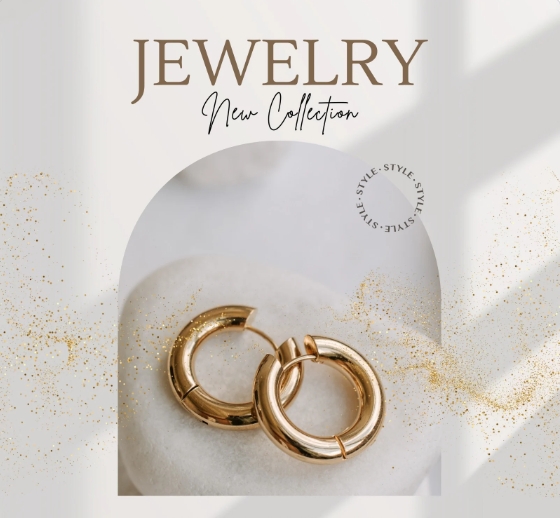
by Y | Aug 26, 2024 | ข่าวสารเว็บไซต์, ข่าวโปรโมชั่น, ทั่วไป อื่นๆ, ออนไลน์น่ารู้, แนะนำสินค้าและบริการ
Jewelry and gold have been cherished throughout history for their beauty,
value, and symbolism. Here’s a comprehensive overview of various aspects
related to jewelry and gold 
Gold in Jewelry 
Types of Gold Used in Jewelry
Yellow Gold The traditional gold color, often alloyed with copper and silver.
White Gold Gold alloyed with white metals such as palladium or nickel, often rhodium-plated to enhance its shine and durability.
Rose Gold Gold alloyed with copper, giving it a pink or reddish hue.
Green Gold Gold alloyed with silver, resulting in a greenish tint.
Black Gold Gold alloyed with other metals and treated to produce a black finish.
Gold Jewelry Styles
Classic Timeless designs such as solitaire rings, simple chains, and stud earrings.
Contemporary Modern and innovative designs, often incorporating mixed materials and unusual shapes.
Vintage/Antique Jewelry designed in past styles, often with intricate details and historical significance.
Custom Tailored pieces designed to meet specific tastes or commemorate special occasions.
Gold Jewelry Care
Cleaning Regularly clean gold jewelry with mild soap and water. Avoid harsh chemicals.
Storage Store gold jewelry separately to prevent scratching and tarnishing. Use soft cloths or pouches.
Maintenance Have pieces checked regularly for wear and tear, especially settings for gemstones.
Gold in Different Cultures and Periods
Choosing gold jewelry involves considering several factors to ensure you get pieces that you love and that suit your needs. Here’s a guide to help you make informed decisions:
Gold Purity
Gold purity is measured in karats (K) or fineness
24K Gold Pure gold, very soft, and not ideal for everyday jewelry but often used in investment pieces or high-end jewelry.
18K Gold Contains 75% gold and is more durable than 24K. It’s a popular choice for fine jewelry.
14K Gold Contains 58.3% gold, more durable and less expensive than 18K. It’s commonly used in engagement rings and other jewelry.
10K Gold Contains 41.7% gold, the least pure but also the most affordable. It’s durable and suitable for everyday wear.
Gold Color
Gold can come in different colors based on the metals mixed with it:
Yellow Gold Traditional and classic, it has a warm, rich hue.
White Gold Alloyed with metals like nickel or palladium, it has a silver-white appearance. It’s often plated with rhodium to enhance its shine and durability.
Rose Gold Alloyed with copper, it has a pinkish hue and is popular for its unique and romantic look.
Green Gold Contains silver and has a distinctive greenish tint, though it’s less common.
Gold Jewelry Styles 
Consider the style and purpose of the jewelry
Necklaces Choose from chains, pendants, or statement pieces. Consider length and design based on your personal style and how you’ll wear them.
Earrings Options include studs, hoops, and dangly earrings. Think about the size and style that complements your face shape and personal taste.
Rings From simple bands to elaborate designs with gemstones. Consider the occasion (e.g., engagement, wedding) and daily wearability.
Bracelets and Bangles Choose based on your wrist size and style preference. Consider whether you want something delicate or bold.
Gold Jewelry Settings
Consider how the gold is used in the design
Prong Setting Holds gemstones securely with metal prongs. Ideal for rings and engagement rings.
Bezel Setting Encircles the gemstone with a metal rim. Provides extra protection and a sleek look.
Channel Setting Stones are set in a channel of metal, providing a seamless look. Common in wedding bands.
Pavé Setting Tiny gemstones are set closely together, creating a sparkling effect. Often used for accent stones.
Fit and Comfort
Ensure that the jewelry fits well and is comfortable to wear
Rings Have your finger sized professionally to ensure a good fit.
Necklaces Choose a length that suits your neckline and style preference.
Bracelets Ensure the bracelet fits comfortably on your wrist without being too tight or too loose.
Maintenance and Care
Gold jewelry requires proper care to maintain its luster
Regular Cleaning Use a mild soap solution and a soft cloth to clean gold jewelry. Avoid harsh chemicals.
Storage Keep gold jewelry in a soft pouch or cloth-lined jewelry box to prevent scratching and tarnishing.
Budget
Set a budget that you’re comfortable with. Gold jewelry can vary widely in price depending on purity, weight, and design. Determine what you’re willing to spend and look for options within that range.
Ethical and Sustainable Choices
If this is important to you, consider jewelry from brands that source gold responsibly or use recycled gold. Look for certifications or transparency about sourcing practices.
Authenticity and Certification
Ensure that the gold jewelry you buy is authentic. Reputable jewelers should provide certification or hallmarks indicating the gold purity. Always purchase from trusted sources to avoid counterfeit products.
By considering these factors, you can choose gold jewelry that complements your style, fits your budget, and meets your quality standards.
Ralyn is an Asian Handmade Jewelry business owned by an Asian American mother and daughter,
dedicated to providing spiritual wellness to our clientele through the creation of bespoke,
handcrafted jewelry pieces, tailored to support and enhance your personal journey towards self-actualization.
Contact Us 
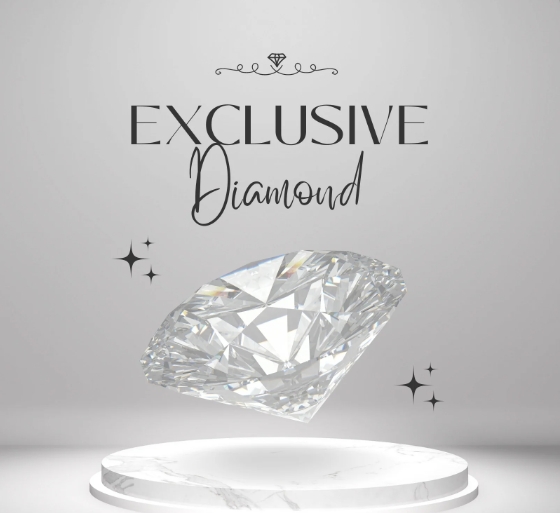
by Y | Aug 21, 2024 | ข่าวสารเว็บไซต์, ทั่วไป อื่นๆ, ออนไลน์น่ารู้, แนะนำสินค้าและบริการ
Diamonds and jewelry have long been prized for their beauty, rarity, and symbolism.
Here’s a breakdown of their significance and various aspects 

Diamonds
What is a Diamond?
A diamond is a precious gemstone known for its exceptional hardness, brilliance, and beauty. It is a crystalline form of carbon where the carbon atoms are arranged in a crystal lattice structure, making it the hardest natural material on Earth.
Key Characteristics of Diamonds
Hardness
Diamonds are rated as 10 on the Mohs scale of mineral hardness, making them the hardest known natural material. This hardness allows diamonds to cut through other materials and resist scratches.
Brilliance
Diamonds exhibit high brilliance due to their high refractive index and dispersion of light. This means they reflect and refract light beautifully, creating their signature sparkle.
Clarity
Clarity refers to the presence of internal or external imperfections, known as inclusions and blemishes, respectively. Higher clarity diamonds have fewer inclusions and blemishes, making them more valuable.
Color
Diamonds come in a range of colors, from colorless to shades of yellow and brown. The more colorless a diamond is, the higher its value. However, diamonds can also be found in various fancy colors like blue, pink, and green.
Cut
The cut of a diamond refers to how well it has been shaped and faceted. The quality of the cut affects the diamond’s brilliance and sparkle. The most popular cut is the round brilliant cut, but there are many other styles such as princess, emerald, and pear cuts. The Four Cs of Diamonds
Carat Weight
The carat weight measures the size of the diamond. One carat equals 0.2 grams. Larger diamonds are rarer and more valuable.
Cut
As mentioned, this describes how well the diamond is cut. It affects the diamond’s overall appearance and sparkle.
Color
The diamond’s color grade ranges from D (colorless) to Z (light yellow or brown). The less color present, the higher the value.
Care and Maintenance
Cleaning Regular cleaning helps maintain a diamond’s brilliance. Use a mild detergent and a soft brush, or a specialized jewelry cleaner.
Storage Store diamonds separately to avoid scratching. Use a soft cloth or jewelry box with compartments.
Diamond Symbols and Significance
Diamonds are often associated with
Eternity Due to their enduring nature and brilliance.
Luxury Their rarity and high value make them symbols of wealth and opulence.
Commitment Commonly used in engagement rings to symbolize enduring love and commitment.
If you have specific questions about diamonds, whether it’s about choosing one, their care, or their significance, feel free to ask!
Symbolism and Meaning
Eternity and Everlasting Love Diamonds are often associated with eternal love and commitment, making them a popular choice for engagement rings and wedding bands.
Strength and Resilience As the hardest natural material on Earth, diamonds symbolize strength and resilience.
Purity and Clarity The clear and transparent nature of diamonds is associated with purity and clarity of thought and emotion.
Famous Diamonds
The Hope Diamond Known for its deep blue color and reputed curse.
The Cullinan Diamond The largest gem-quality diamond ever found, from which the Cullinan I (Great Star of Africa) was cut.
The Koh-i-Noor A historic diamond with a long and complex history, currently set in the Crown Jewels of the United Kingdom.
Diamonds are among the most coveted and valuable gemstones in the world, celebrated for their brilliance, durability, and rarity. Here’s a detailed look at various aspects of diamonds:
Formation and Characteristics
Formation : Diamonds are formed deep within the Earth’s mantle under extreme pressure and temperature conditions. They are composed of carbon atoms arranged in a crystal lattice structure, which gives them their exceptional hardness and brilliance.
Hardness : Diamonds are the hardest natural substance known, scoring a 10 on the Mohs scale of mineral hardness. This makes them highly resistant to scratching and ideal for use in various industrial applications as well as in jewelry.
Diamonds come in a range of colors, but the most valued diamonds are colorless. The color grading scale ranges from D (colorless) to Z (light yellow or brown). The less color a diamond has, the higher its value.
Clarity measures the presence of internal or external imperfections, known as inclusions and blemishes. The grading scale ranges from Flawless (no inclusions or blemishes visible under 10x magnification) to Included (inclusions and/or blemishes visible to the naked eye).
Carat weight measures the size of the diamond. One carat equals 0.2 grams. Larger diamonds are rarer and typically more valuable, but carat weight alone does not determine a diamond’s value; cut, color, and clarity also play significant roles.
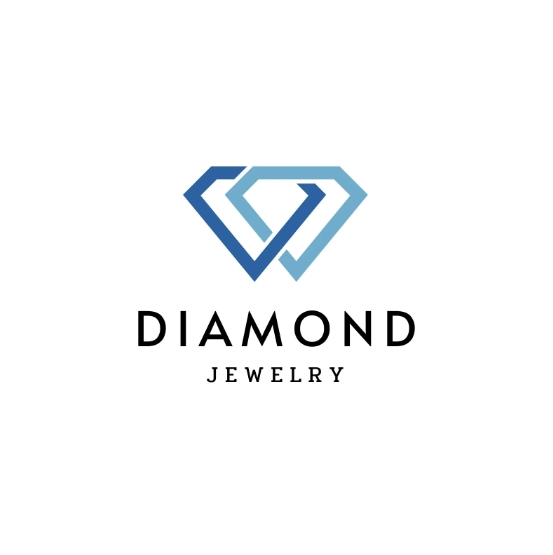
Jewelry
Types of Jewelry
Rings Including engagement rings, wedding bands, and fashion rings.
Necklaces Ranging from simple chains to elaborate statement pieces.
Earrings From studs and hoops to dangly and chandelier styles.
Bracelets Including bangles, cuffs, and charm bracelets.
Brooches and Pins Often used for decoration or as a personal statement.
Materials
Precious Metals Gold (yellow, white, rose), silver, and platinum are commonly used for fine jewelry.
Gemstones Besides diamonds, other gemstones like sapphires, rubies, emeralds, and semi-precious stones like amethyst and garnet are popular.
Cultural and Historical Significance
Royalty and Ceremonial Use Jewelry often signifies power and status, used in crowns, scepters, and ceremonial regalia.
Personal Expression Jewelry allows individuals to express their personal style and identity.
Cultural Traditions Many cultures have specific jewelry traditions, such as Indian wedding jewelry, African tribal adornments, and Native American designs.
Trends and Styles
Vintage and Antique Jewelry from specific historical periods, valued for its craftsmanship and historical context.
Modern and Contemporary Innovative designs and materials that reflect current fashion trends.
Custom and Personalized Tailored pieces that reflect personal stories or milestones.
Jewelry, especially diamonds, carries both aesthetic appeal and significant emotional and symbolic value, making it a timeless and cherished form of adornment.
Asian Handmade Jewelry 
Ralyn is an Asian Handmade Jewelry business owned by an Asian American mother and daughter,
dedicated to providing spiritual wellness to our clientele through the creation of bespoke,
handcrafted jewelry pieces, tailored to support and enhance your personal journey towards self-actualization.
Contact Us 
IG : ralynjewelry
Facebook : Ralyn
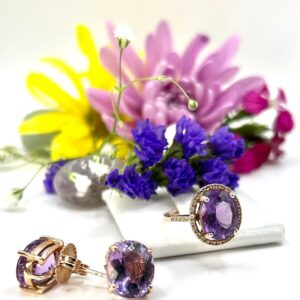
by osccare | Aug 8, 2024 | ทั่วไป อื่นๆ, ออนไลน์น่ารู้, แนะนำสินค้าและบริการ
Jewelry and gemstones are fascinating subjects! Jewelry has been a form of adornment and personal expression for thousands of years, and gemstones are often used in jewelry for their beauty and symbolic meanings.
Here are some key points
Jewelry
Types Jewelry can include rings, necklaces, bracelets, earrings, brooches, and more.
Materials Common materials include metals like gold, silver, and platinum, as well as gemstones and other materials like pearls and enamel.
Styles From vintage to contemporary, Asian handmade jewelry there are countless styles, including Art Deco, minimalist, bohemian, and others.
Gemstones
Precious Stones Traditionally, these include diamonds, rubies, sapphires, and emeralds. They are valued for their rarity, durability, and beauty.
Semi-Precious Stones These include amethyst, garnet, peridot, and topaz. They are generally less rare but can still be stunning and valuable.
Synthetic Stones Created in laboratories, they can mimic the appearance of natural gemstones and are often more affordable.
Birthstones Many people choose gemstones based on their birth month, such as garnet for January or sapphire for September.
Handcrafted jewelry is a special category that emphasizes craftsmanship, uniqueness, and often a personal touch. Here’s an overview of what makes Asian handmade jewelry distinct and some aspects to consider.
Characteristics of Hand Crafted Jewelry
1. Unique Designs Each piece is typically one-of-a-kind or produced in very limited quantities, making it unique compared to mass-produced items.
2. Artisanal Quality Handmade jewelry often showcases the skills and creativity of the artisan, with attention to detail and personalized touches that add value and character.
3. Materials Artisans might use a variety of materials, including traditional metals and gemstones, as well as unconventional materials like resin, recycled materials, or handcrafted beads.
4. Techniques Handmade jewelry can be crafted using various techniques such as metalworking, beadwork, wire wrapping, and enameling. Each method contributes to the piece’s unique look and feel.
5. Customization Many artisans offer custom services, allowing you to personalize a piece to fit your style or to commemorate a special event.
6. Sustainability Asian Handmade Jewelry often emphasizes sustainable practices, such as using ethically sourced materials or employing eco-friendly methods.
1. Craft Fairs and Markets These venues are great for discovering local artisans and their unique creations.
2. Online Marketplaces Websites like Etsy and even Instagram have a wealth of handmade jewelry from around the world.
3. Local Artisan Shops Many cities have boutiques or galleries that feature handmade jewelry from local artists.
4. Custom Orders If you have a specific vision, many artisans accept custom orders, which can be a wonderful way to create a piece that’s truly personal.
Caring for Handmade Jewelry
1. Storage Keep pieces in a cool, dry place, ideally in a soft pouch or jewelry box to prevent scratches and tarnishing.
2. Cleaning Follow care instructions specific to the materials used. Some pieces might be cleaned with a soft cloth, while others may require gentle cleaning solutions.
3. Repairs Handmade jewelry might be more delicate than mass-produced items, so handling with care and seeking professional repair services when needed is advisable.
Hand Crafted jewelry can be a beautiful way to express your personal style and support independent artists. If you’re interested in making your own, there are also many resources and tutorials available to get you.

![]()
![]()





